Report on the CARN study day/Pre-conference workshop on the 4th February, 2016, hosted by Rachael Burgess in Bath, for the ‘1st Global Assembly for Knowledge Democracy: towards an ecology of knowledges’ in Cartegena on the 16th June 2017. A description of the event can be found here.
Jack Whitehead, University of Cumbria
6th February 2017
The purpose of this study day was to prepare for the 1st Global Assembly for Knowledge Democracy on the 16th June 2017, in the Action Research Network of the Americas (ARNA) conference in Cartagena between the 12-16th June 2017 with the theme of ‘Participation and Democratisation of Knowledge: New Convergences for Reconciliation’ (see http://www.actionresearch.net/writings/brief.pdf). The study day built on our learning from the Town Hall Meeting convened by Jacqueline Delong at the 2015 ARNA conference in Toronto with the multi-media living-posters gathered and organised by Marie Huxtable and myself in the UK (see http://www.actionresearch.net/writings/posters/homepage061115.pdf ) with multi-screen SKYPE participations and living-posters from educational researchers who used a variety of methodologies but all shared a commitment to enhancing their educational influences in learning even if they didn’t see themselves as researching their educational influence and creating their living-theories. These researchers came from different countries including, Japan, South Africa, Canada, Columbia, India, Australia, China, Albania, Croatia, Ireland and the UK.
The study day extended our learning about i~we~i relationships in a collaborative community of practice. During the day we also extended our understanding of Action Research, Self-study, Autoethnography and the insights they offered to Living Theory researchers. We also considered recent writings on non-Western epistemologies from East-Asian perspectives (Inoue, 2012; 2014) and divisions, conflicts and exclusions between epistemologies of the North and South (Santos, 2014).
I facilitated the conversations in which participants shared our living-educational-theories, with our living-posters (see below).
Following on from our workshop conversations over the next few months I intend to work with others to demonstrate, before the Global Assembly, how the epistemologies of our Living Theory perspectives transcend exclusions and conflicts of the epistemological categories of North, South, East and West, with the living logics of conversations and explanations of educational influences with values, as explanatory principles, that carry hope for the flourishing of humanity.
Some members of Conversation Café relate the idea of an ecology of knowledges to Bateson’s (1987) idea of an ecology of mind and to the idea of natural inclusion or inclusionality which Rayner (2004) describes as a relationally dynamic awareness of space and boundaries that are connective, reflexive and co-creative. We work with a ‘process understanding’ of both ‘I’ and ‘We’ that we represent as ‘i~we~i’ to emphasise this process and relational understanding in which ‘I am because we are’ and ‘we are because I am’. ‘I am because we are’ draws insights from the African expression of an ‘Ubuntu’ way of being (Charles, 2007). ‘We are because I am’, draws insights from Huxtable’s (2016) understandings of ‘i~we~i’ . I experience a tension in my use of ‘I’ and ‘We’. My use of ‘I’ can appear as egotistical in the sense of an independent and autonomous ‘I’ that is failing to recognise the influence and contributions of others. My use of ‘We’ can appear to be colonising in the sense that I haven’t checked with others that I have their agreement for me to include them in my use of ‘We’. I continue to engage with this tension in contributing to an ecology of knowledges.
Gadamer’s (1975, p. 367) ideas were also brought into the art of our conversation in order to develop a productive conversation:
To conduct a dialogue requires first of all that the partners do not talk at cross purposes. Hence it necessarily has the structure of question and answer. The first condition of the art of conversation is ensuring that the other person is with us. … To conduct a conversation means to allow oneself to be conducted by the subject matter to which the partners in the dialogue are oriented. It requires that one does not try to argue the other person down but that one really considers the weight of the other’s opinion. Hence it is an art of testing. But the art of testing is the art of questioning. For we have seen that to question means to lay open, to place in the open. As against the fixity of opinions, questioning makes the object and all the possibilities fluid. A person skilled in the ‘art’ of questioning is a person who can prevent questions being suppressed by the dominant opinion. A person who possesses this art will himself search for everything in favour of an opinion. Dialectic consists not in trying to discover the weakness of what is said, but in bringing out its real strength. It is not the art of arguing (which can make a strong case out of a weak one) but in the art of thinking (which can strengthen objections by referring to the subject matter).
Our conversations in the CARN study day were informed by the collections of living-posters below. You can access all the posters from the following url and access the individual contributions to the various networks.
Bruce Damons in South Africa, Qutoshi Sadruddin in Pakistan and Liz Campbell in Canada, joined us through SKYPE. The recording of their contributions shows how the digital technology helps to give people a virtual presence in a space that transcends geographical distance and impermeable boundaries. Their living-posters below are offered as examples of how technology can also be used to bring people into such a space.
Sadruddin Quotoshi’s poster at: http://www.actionresearch.net/writings/posters/qutoshi010217.pdf focuses on his work in Gilgit-Baltistan, one of the remote areas of Pakistan connecting China with the Karakorum High Way, with his question ‘How can I contribute towards developing transformative living theorists in my context?’
Bruce Damon’s poster at http://www.actionresearch.net/writings/posters/bruce010217.pdf . Focuses on his work in the coastal metropole of Nelson Mandela Bay, South Africa, in the Centre for the Community School (CCS). This is an engagement entity within the Faculty of Education at the Nelson Mandela Metropolitan University. The Centre for the Community School works within the public schooling system both peri-urban and rural and specifically with socially and economically marginalized communities. Together with school communities, CCS contributes to enabling every child to reach their full potential.
Liz Campbell’s poster focuses on her contribution to the Bluewater Action Research Network in Canada at http://www.actionresearch.net/writings/barn/barn010217.pdf .

Liz’s doctoral enquiry includes the original idea of ‘being loved into learning’ as an explanatory principle in the creation of her living-educational-theory.
This data can be used as evidence, in explaining the educational nature of our conversations through which we are evolving and sharing our contributions to an ecology of knowledges that transcends the divisions and exclusions reinforced by the categories Northern, Southern, Eastern and Western epistemologies.
For example the following still images show the inclusion of others within the space in a way that individuals commented they felt the individuals on SKYPE were present in the room with them.
Sadruddin Qutoshi in Pakistan, Bruce Damons in South Africa
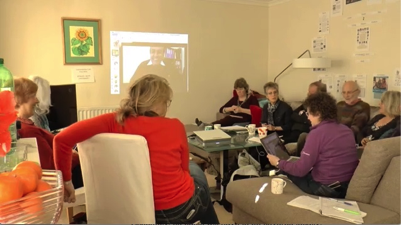
Liz Campbell in Canada with Bruce.
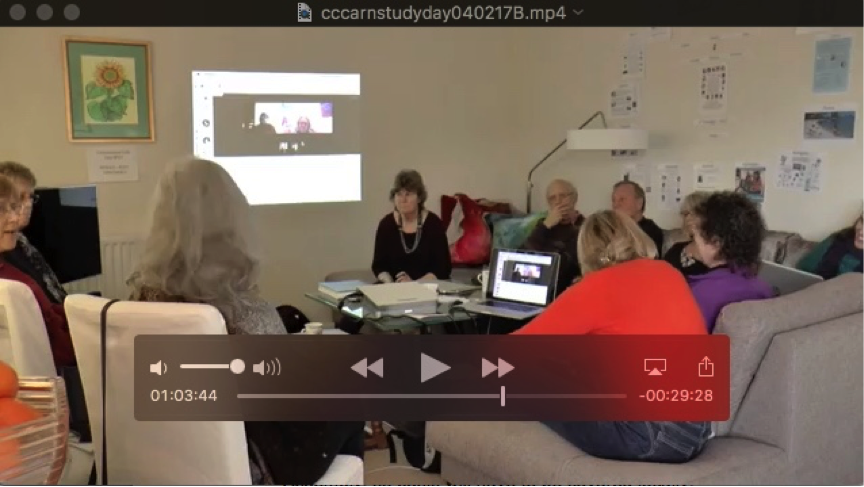
This brief video clip below shows the inclusion of Bruce’s contribution to our conversation on the nature of democracy.
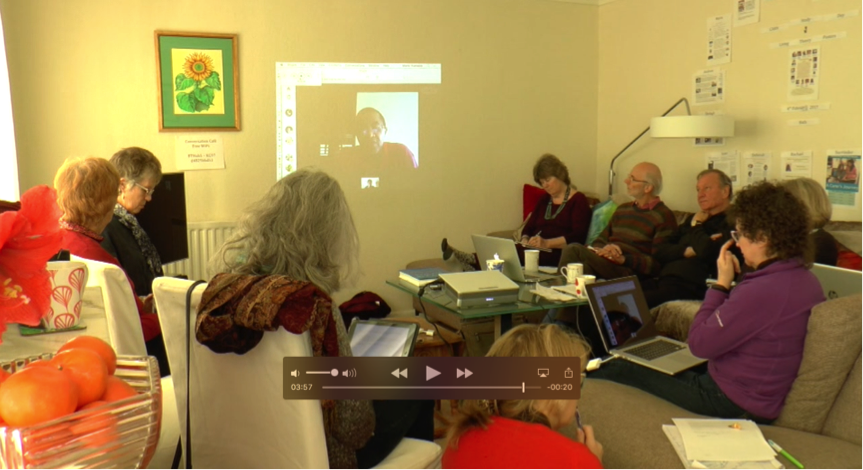
On the right of the wall can be seen the living-posters of members of Conversation Café with a poster of Margaret Wadsley. Margaret came down from Edinburgh from an Adlerian Research group convened by Robyn Pound (who also arranged the lunch for the day). Our hostess Rachael Burgess provided the space as a community space and had printed off the posters and displayed them on the wall. You can access each individual poster by opening the url http://www.actionresearch.net/writings/posters/conversationcafe010217.pdf
And clicking on the individual contributions:
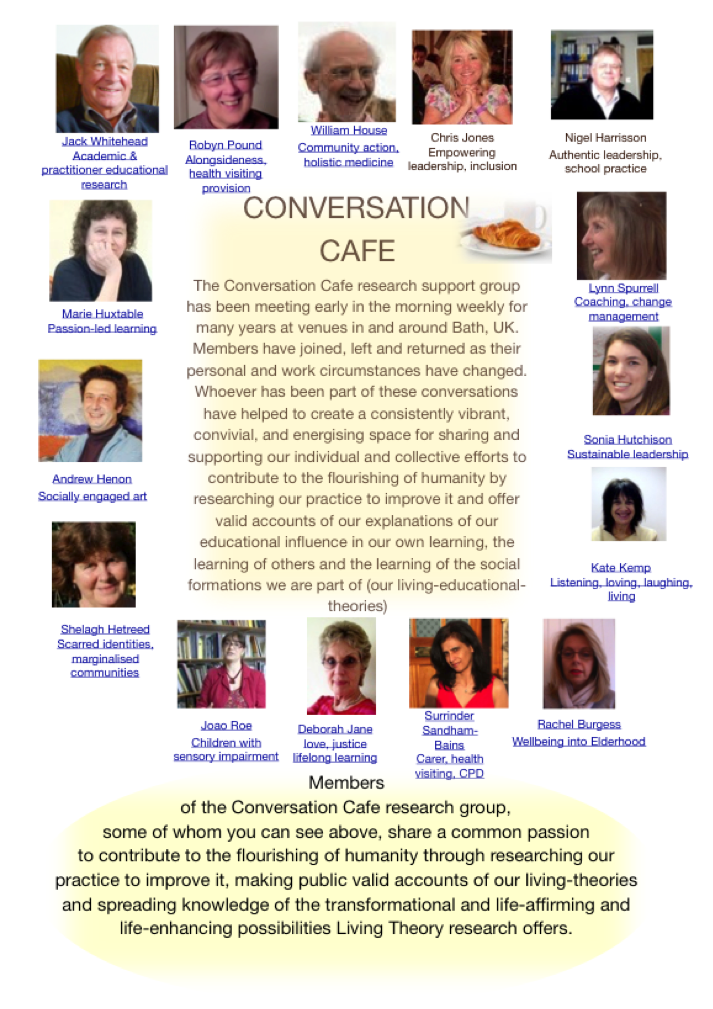
Each individual with their living-poster exists within a network of i~we~i relationships between other individuals, groups and communities shown on the following homepage of living-posters:
Click to access homepage010217.pdf
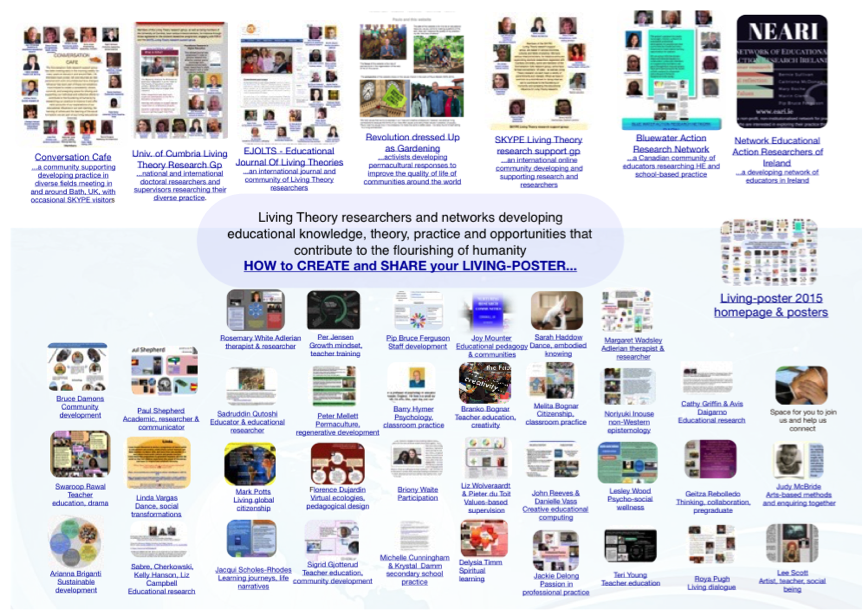
One connection we are making to the ideas of de Sousa Santos (2014) on ‘Justice against Epistemicide’ is through the idea coined (with some humour) by Peter Mellett of ‘Pan-epistemegenesis’. The term is used to mean a global movement that is focused on the creation (or birth) of knowledges. Whilst we understand de Sousa Santos’ focus on justice against epistemicide (Whitehead, 2016) we go further by holding ourselves to account to research our efforts to live our values that carry hope for the flourishing of humanity, as fully as possible. These values have unique expression in an individual’s practice. They form the explanatory principles of each of us in our explanations of educational influence. These explanations are our individual living-theories. As we share our living-theories (Whitehead, 1989) we can contribute to Living Theory research as a social movement that is committed to enhancing the flow of values and understandings that carry hope for the flourishing of humanity.
In the centre of the homepage of living-posters are the details of how you can contribute your own as we move towards the 1st Global Assembly for Knowledge Democracy: towards an ecology of knowledges, in Cartagena on the 16th June 2016 at the end of the 2017 Action Research Network of the Americas conference 12-16 June with the theme of ‘Participation and Democratisation of Knowledge: New Convergences for Reconciliation’
In a note about the pre-conference workshops for the 1st Global Assembly Lonnie Rowell, a co-chair, suggests that we might address the following questions – here are the beginnings of some tentative anwers.
- What knowledge ecologies are appropriate/recognized for our context? And why?
I think that a range of knowledge ecologies are appropriately recognised for our context. These include the ecology of knowledges described by de Sousa Santos (2014) and Inoue (2012, 2014). They include the knowledge ecologies offered by participants in the above workshop with the virtual presences of their living-posters. They include Cairns, H. & Harney, I, B. (2014) Four Circles – Customs that are Law in an Aboriginal Cosmoscape: Justice, Mercy and survival in Bill Harney’s Imulun Wardaman Aboriginal Spiritual Law. (A Northern Australian People with their Intellectual World of Law in the Four Circles Tradition.) Published by Alan Mogridge of Excell Printing Group, Merimbula; Australia – see http://www.hughcairns.com.au/ and http://www.actionresearch.net/writings/cairnsharneyimulun020916.pdf . They also include Lee, C. & Rochon, R. (2009) 2010 AERA Annual Meeting Theme: Understanding Complex Ecologies in a Changing World.
One reason that these knowledge ecologies are appropriate for our context of encouraging knowledge democracy is that they are different ways of knowing with their units of appraisal, their standards of judgement and the living logics that distinguished different forms of rationality.
- How can we (do we) address the democratization of knowledge within our teaching and research?
I like the way Moira Laidlaw has done this in The Democratising Potential of Dialogical Focus in an Action Enquiry see:
http://www.tandfonline.com/doi/pdf/10.1080/0965079940020207?needAccess=true
- What are the political and pragmatic implications of knowledge democratization? What principles/philosophies might inform them?
I engaged with, and analysed, some of these implications in ‘The Growth of Educational Knowledge: Creating your own living educational theories. Retrieved 7 February 2017 from http://www.actionresearch.net/writings/jwgek93.htm
I think it likely that knowledge democratization will need to engage with the ideas in
Whitehead, J. & Rayner, A. (2006) From Dialectics to Inclusionality
A naturally inclusive logic for environmental and educational accountability. Retrieved 7 February 2017 from http://www.actionresearch.net/writings/jack/arjwdialtoIncl061109.pdf
- What research methodologies might advance such knowledge?
I think that insights from Living Theory research, Action Research, Narrative Inquiry, Case Study, Grounded Theory, Phenomenology, Ethnography and Autoethnography can be shown to be contributing to the advancement of such knowledge.
Lonnie also suggests that each workshop could compile a composite paper to feed into the Assembly. I’ll see if the participants in the 4th February workshop can do this.
References
Bateson, G. (1987) Steps to an ecology of mind. London; Jason Aronson Inc.
Charles, E. (2007) How Can I Bring Ubuntu As A Living Standard of Judgement Into The Academy? Moving Beyond Decolonisation Through Societal Reidentification And Guiltless Recognition. Retrieved 7 February 2017 from http://www.actionresearch.net/living/edenphd.shtml
de Sousa Santos, B. (2014) Epistemologies of the South: Justice against Epistemicide. London; Paradigm Publishers.
Educational Journal of Educational Theories (2016) Issue 9(2) December 2016. Retrieved 6 February 2017 from http://ejolts.net
Huxtable, M. (2016) Integrating personal, political, and professional educational practice that gives meaning and purpose to my life and work. Educational Journal of Living Theories, 9(2); 1-23. Retrieved 6 February 2017 from http://ejolts.net/node/284
Inoue, N. (2012) Mirrors of the Mind: Introduction to Mindful Ways of Thinking Education. New York; Peter Lang.
Inoue, N. (2014) Beyond Actions: Psychology of Action Research for Mindful Educational Improvement. New York; Peter Lang.
Rayner, A. (2004) INCLUSIONALITY: The Science, Art and Spirituality of Place, Space and Evolution.
Whitehead, J. (1989) Creating a living educational theory from questions of the kind, “How do I improve my practice?’ Cambridge Journal of Education, 19(1); 41-52. Retrieved on 7 February 2017 from http://www.actionresearch.net/writings/livtheory.html
Whitehead, J. (2016) Book review of de Sousa Santos, B. (2014). Epistemologies of the South: Justice against Epistemicide. London: Paradigm Publishers. Educational Journal of Living Theories, 9(2); 87-98. Retrieved 7 February 2017 from http://ejolts.net/node/288

I read the post that includes ideas from different sources and thought processes of individual action researchers. Good lesson for action researchers in Sri Lanka to use the existing theory and our own perspectives for a discussion on action research.
LikeLike